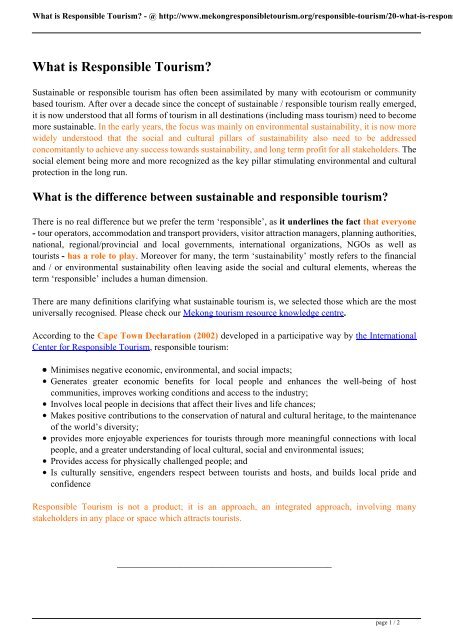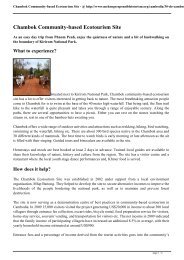What is the difference between sustainable and responsible tourism?
What is the difference between sustainable and responsible tourism?
What is the difference between sustainable and responsible tourism?
Create successful ePaper yourself
Turn your PDF publications into a flip-book with our unique Google optimized e-Paper software.
<strong>What</strong> <strong>is</strong> Responsible Tour<strong>is</strong>m? - @ http://www.mekong<strong>responsible</strong>tour<strong>is</strong>m.org/<strong>responsible</strong>-tour<strong>is</strong>m/20-what-<strong>is</strong>-respons<strong>What</strong> <strong>is</strong> Responsible Tour<strong>is</strong>m?Sustainable or <strong>responsible</strong> tour<strong>is</strong>m has often been assimilated by many with ecotour<strong>is</strong>m or communitybased tour<strong>is</strong>m. After over a decade since <strong>the</strong> concept of <strong>sustainable</strong> / <strong>responsible</strong> tour<strong>is</strong>m really emerged,it <strong>is</strong> now understood that all forms of tour<strong>is</strong>m in all destinations (including mass tour<strong>is</strong>m) need to becomemore <strong>sustainable</strong>. In <strong>the</strong> early years, <strong>the</strong> focus was mainly on environmental sustainability, it <strong>is</strong> now morewidely understood that <strong>the</strong> social <strong>and</strong> cultural pillars of sustainability also need to be addressedconcomitantly to achieve any success towards sustainability, <strong>and</strong> long term profit for all stakeholders. Thesocial element being more <strong>and</strong> more recognized as <strong>the</strong> key pillar stimulating environmental <strong>and</strong> culturalprotection in <strong>the</strong> long run.<strong>What</strong> <strong>is</strong> <strong>the</strong> <strong>difference</strong> <strong>between</strong> <strong>sustainable</strong> <strong>and</strong> <strong>responsible</strong> tour<strong>is</strong>m?There <strong>is</strong> no real <strong>difference</strong> but we prefer <strong>the</strong> term ‘<strong>responsible</strong>’, as it underlines <strong>the</strong> fact that everyone- tour operators, accommodation <strong>and</strong> transport providers, v<strong>is</strong>itor attraction managers, planning authorities,national, regional/provincial <strong>and</strong> local governments, international organizations, NGOs as well astour<strong>is</strong>ts - has a role to play. Moreover for many, <strong>the</strong> term ‘sustainability’ mostly refers to <strong>the</strong> financial<strong>and</strong> / or environmental sustainability often leaving aside <strong>the</strong> social <strong>and</strong> cultural elements, whereas <strong>the</strong>term ‘<strong>responsible</strong>’ includes a human dimension.There are many definitions clarifying what <strong>sustainable</strong> tour<strong>is</strong>m <strong>is</strong>, we selected those which are <strong>the</strong> mostuniversally recogn<strong>is</strong>ed. Please check our Mekong tour<strong>is</strong>m resource knowledge centre.According to <strong>the</strong> Cape Town Declaration (2002) developed in a participative way by <strong>the</strong> InternationalCenter for Responsible Tour<strong>is</strong>m, <strong>responsible</strong> tour<strong>is</strong>m:Minim<strong>is</strong>es negative economic, environmental, <strong>and</strong> social impacts;Generates greater economic benefits for local people <strong>and</strong> enhances <strong>the</strong> well-being of hostcommunities, improves working conditions <strong>and</strong> access to <strong>the</strong> industry;Involves local people in dec<strong>is</strong>ions that affect <strong>the</strong>ir lives <strong>and</strong> life chances;Makes positive contributions to <strong>the</strong> conservation of natural <strong>and</strong> cultural heritage, to <strong>the</strong> maintenanceof <strong>the</strong> world’s diversity;provides more enjoyable experiences for tour<strong>is</strong>ts through more meaningful connections with localpeople, <strong>and</strong> a greater underst<strong>and</strong>ing of local cultural, social <strong>and</strong> environmental <strong>is</strong>sues;Provides access for physically challenged people; <strong>and</strong>Is culturally sensitive, engenders respect <strong>between</strong> tour<strong>is</strong>ts <strong>and</strong> hosts, <strong>and</strong> builds local pride <strong>and</strong>confidenceResponsible Tour<strong>is</strong>m <strong>is</strong> not a product; it <strong>is</strong> an approach, an integrated approach, involving manystakeholders in any place or space which attracts tour<strong>is</strong>ts._______________________________________________page 1 / 2
Powered by TCPDF (www.tcpdf.org)<strong>What</strong> <strong>is</strong> Responsible Tour<strong>is</strong>m? - @ http://www.mekong<strong>responsible</strong>tour<strong>is</strong>m.org/<strong>responsible</strong>-tour<strong>is</strong>m/20-what-<strong>is</strong>-responsResponsible Tour<strong>is</strong>m Guide to <strong>the</strong> Mekongpage 2 / 2



